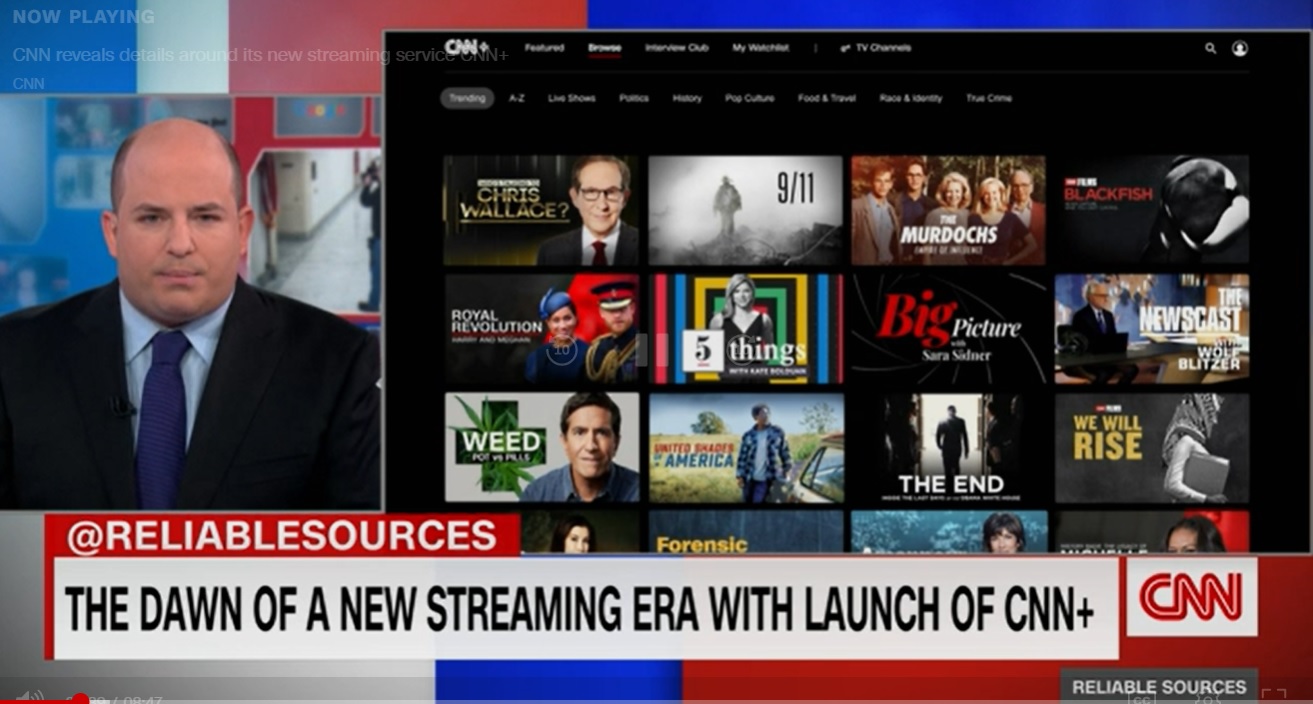CNN Plus Launch Gets 'Reliable Sources' Plug
MacCallum says earliest sign-ups after March 29 launch get half-off 'for life'

The smarter way to stay on top of broadcasting and cable industry. Sign up below
You are now subscribed
Your newsletter sign-up was successful
Billing it as "revealing" new details, CNN used its Reliable Sources Sunday show, which focuses on "how the news gets made," to promote how CNN plans to make some news of its own with the March 29 launch of CNN Plus, its subscription supported streaming service.
Reliable Sources host Brian Stelter, who is hosting an online version of Reliable Sources, began by labeling his network "an icon of the cable and satellite age," then said that there was currently no subscription TV news streaming service currently in the U.S.
Enter CNN, whose launch of the streaming service was "a big deal" because it was the biggest bet any company has made in the news streaming world."
As the screen graphic trumpeted "The Dawn of a New Streaming Era with Launch of CNN+," Stelter said the company had hired hundreds of new staffers and already created dozens of new shows. He said it was "kind of like Netflix and HBO Max" (the latter co-owned with CNN) in that subscribers get a library of TV shows and films. But he said it was different in that you also got live news and interactive interviews.
Stelter said as he worked on his show for the service (daily at 11 a.m. on CNN Plus), he had enjoyed unlearning things he had done on TV. For example, he said, "you don't say good morning on streaming because somebody might watch an hour later in the afternoon."
By way of introducing the channel's top brass--Andrew Morse, head of CNN Plus, and Alex MacCallum, head of product--for a segment that had intimations of infomercial "news interviews," Stelter said he had some questions about what the value proposition of the streaming service was.
MacCallum said it was "to leverage CNN's trust and credibility and incredible journalistic expertise to bring new forms of storytelling to customers." She said that meant giving people what they want to watch, where and when they want to watch it; live programming, with eight new shows every day--and to empower users through interactive opportunities like Interview Club. The show then aired a promo for Interview Club.
Morse said the combination of live programming, "a massive on demand library," and interactivity were what made the channel "truly unique," that and the CNN brand, though arguably that has taken a bit of a hit, at least in media circles, with the high-profile exit of former chief Jeff Zucker and the firing of Chris Cuomo.
Stelter asked why the cable feed of CNN would not also be offered on CNN Plus, which would make it easier to transition from traditional cable to an over-the-top service down the line. Morse said the relationships the channel has with cable providers are important, as it was with the audience watching the cable channel. He said that was why they tried to make the channel distinctive and complementary, which meant there would be a lot of interplay between the channel and CNN+, he said.
Stelter asked about the streaming "competitive marketplace," citing Fox Nation, Fox's streaming news service, though Stelter called that "a lot of entertainment programming," and ABC, CBS, NBC, which all had "free, ad-supported streaming services," and asked why CNN+ was doing something different.
Morse suggested it was because CNN brought a different set of assets as a global news operation unlike anyone else with the possible exception of the BBC. As to being subscription-driven, Morse said CNN Plus should be compared to the New York Times, which has been reworded for its digital transformation in the subscription department, the metric that will determine CNN Plus's ultimate success.
MacCallum said that, yes, the number of subscriptions and renewals will be how they measure success.
In keeping with the infomercial tone, Stelter asked how much the service would be: "$5.99," said MacCallum," but quickly added: "But we have an offer for the first four weeks of half off for life."
Stelter followed with a clarification: "$3 bucks for as long as I stay a member?" MacCallum said "50% off for as long as you stay a member," which suggests if the regular price goes up, the half-off will be of that higher price, which would essentially be an inflation clause. ■
The smarter way to stay on top of broadcasting and cable industry. Sign up below
Contributing editor John Eggerton has been an editor and/or writer on media regulation, legislation and policy for over four decades, including covering the FCC, FTC, Congress, the major media trade associations, and the federal courts. In addition to Multichannel News and Broadcasting + Cable, his work has appeared in Radio World, TV Technology, TV Fax, This Week in Consumer Electronics, Variety and the Encyclopedia Britannica.

